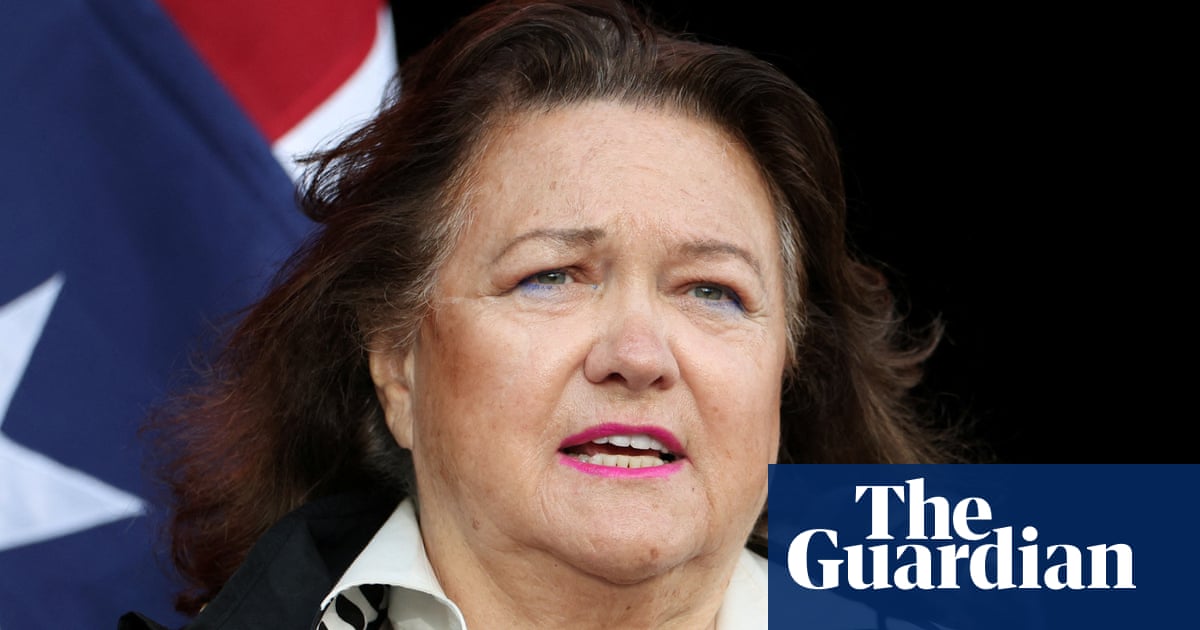Gina Rinehart has encouraged the Liberal party to stick with Donald Trump-like policies after the opposition’selectoral thumping on Saturday nightin a campaign overshadowed by the controversial US president.
The mining billionaire also singled out Italy and Hungary, which are governed by populist rightwing coalitions, as countries Australia could aspire to, where people were “abandoning the myths or untruths of the left” and returning to “common sense and truth”.
Anthony Albanese won a second term as prime minister with a crushing victory against his conservative challenger, Peter Dutton, who failed tobrush off comparisons with Trumpand ended uplosing his own seat.
In a lengthy statement to the Daily Mail on Monday, Australia’s richest person broke her silence following the Coalition’s wipeout on Saturday night.
“The left media did a very successful effort, frightening many in theLiberal partyfrom anything Trump, and away from any Trump-like policies,” she wrote.
“This has been especially obvious this year, with the Liberals instead becoming known as the ‘me too’ party. Trump-style ‘make Australia great’ policies via cutting government tape, government bureaucracy and wastage, and hence being able to cut taxes, too scarce in Australia this year to rate a mention.
Sign up for Guardian Australia’s breaking news email
“No doubt the left media will now try to claim that the Liberal loss was because the Liberal party followed Trump and became too right! The two simply don’t add up!”
Rinehart urged the Liberals to return to “commonsense and truth” principles as a first port of call while rebuilding the party, which together with the Nationals could be left with as a few as 42 seats.
She added voters were “very short on understanding” that new investments create revenue and living standards, leading to jobs and economic prosperity.
“It shouldn’t be rocket science, but apparently it is,” Ginehart said.
The mining billionaire, who hadcultivated a close relationship with Duttonas opposition leader, then turned her attention to left-leaning voters.
Referencing a trip to the US before last November’s election, Rinehart said she had met with former Democrat voters who had since turned Republican.
“Why are Americans getting it, and we aren’t?” Rinehart said.
“There are dedicated organisations working hard to bring back common sense and truth in the USA.”
Rinehart said Argentina had been a socialist country for more than a century, leaving its “people suffering terribly” before its rightwing leader,Javier Milei, took office in 2023.
The self-declared “anarcho-capitalist” hascommitted Argentina to leaving the World Health Organizationand the Paris accord in moves mirroring Trump.
Rinehart also pointed to Italy and Hungry, where populist rightwing coalition governments rule, as countries that “get it” and ones Australia should look to.
Sign up toBreaking News Australia
Get the most important news as it breaks
after newsletter promotion
Hancock Prospecting’s executive chairwoman mostly stayed mum during the federal election, airing her policy ideas only once during an Anzac Day eve speech.
To an audience that included three former prime ministers – John Howard, Tony Abbott and Scott Morrison – along with Dutton and the defence minister, Richard Marles, Rinehart said Australia needed to lift its defence spending to at least 5% of GDP and invest in an Israeli-style Iron Dome defence system.
At her national mining day event last November, Rinehart said Australia should learn from the success of Trump.
“As I have repeatedly stated, we need to cut government tape, regulations, governments’ wastage and tax burdens across Australia,” Rinehart said.
“We need a USA-style Doge [department of government efficiency] that delivers action, one that helps to return dollars to our pockets and investment back to Australia.
“Don’t be frightened to call for ‘make our bank accounts great again’.”
The Coalition’s Indigenous affairs spokesperson, Jacinta Nampijinpa Price, also came under fire for her support of Trump during the campaign,after she used the popularised catchphrase“make Australia great again” during a supporter rally in Perth.
The Northern Territory senator, who was the face of the opposition’s successful no campaign, seldom appeared at other events or stops throughout the campaigning period.
On Monday, Price described her sidelining as being “absolutely frustrating” given her visible role in the voice campaign.
“We probably didn’t capitalise enough on the outcome of the referendum, the success of the coalition in that regard,” she told the Kenny Report on Sky News.
“The fact that we didn’t pin that to the prime minister effectively enough. I think that’s that was a lost opportunity there.”
Price also compared the media to a “bunch of vultures” who “will absolutely go you on one particular issue and smear you” with “another country’s president”.
